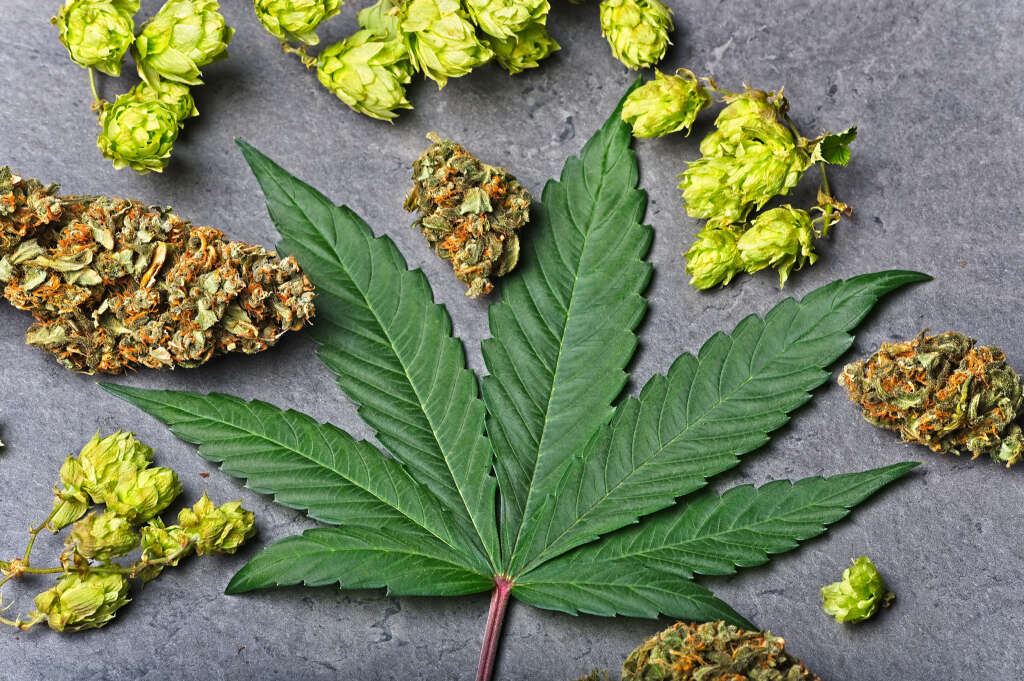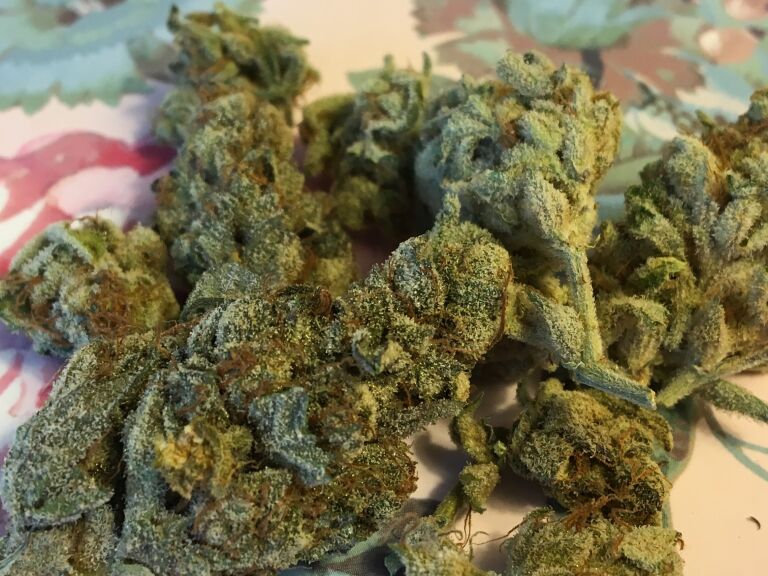“A good laugh and a long sleep are the best cures for anything.”
Irish Proverb
We live in a time when sensory overkill is the norm, and it’s having detrimental effects on our sleep quality. Cannabis has a rich history as a valued sleep aid. After all, it’s the ECS that modulates the neurotransmitters that control your sleep patterns, and cannabis oil contains cannabinoid molecules that mirror the cellular-signaling actions of the cannabinoids your body would make enough of- if it could at the moment.
Disrupted Stages of Sleep
A healthy brain goes through a series of stages, beginning with a gentle letting go of the day and progressing through deeper levels. Throughout the night the brain cycles through energy frequencies that restore and reset both brain and body.
At the end of the cycle, the brain energetically works its way back to consciousness, leaving deep sleep behind, progressing to lighter stages, ending with REM sleep, where our eyes rapidly dance through our dreams as the brain gently comes back to wakefulness.
Your central nervous system works more efficiently when it can take in all the incoming sensory data and analyze it from a reality-based perspective. The fastest way to tear your nervous system apart so it’s more likely to make incorrect perceptions and follow up with inappropriate actions is to deprive yourself of sleep.
Poor sleep quality can lead to a cascade of complications, including:
- anxiety
- depression
- memory problems
- anger issues
- increasing the risk of heart disease
- making it more likely that you’ll have an accident
Why do we sleep?

The simple answer is that we have to rest due to the incessant need our brains have to analyze and focus. While we’re resting, the external world doesn’t really impact us.
But there are many important reasons for improving its quality.
- It resets your ability to be focused, alert and emotionally stable in the wakeful period.
- While you sleep your brain gets busy processing things you learned during the day, from short-term memory to long-term storage.
- During peaceful, relaxing sleep the cells have time to repair damage without having to focus so much on responding to the environment.
- Deep, restful sleep allows the cerebrospinal fluid enough time to clean up the deepest recesses of the brain, washing out toxins and keeping everything well-hydrated and nourished.
- A balanced cycle helps the gut get ready for the next day, and we all know that a happy gut goes a long way to keeping a body happy and healthy.
The way you sleep directly impacts the focus and motivation you’ll express when you’re awake. Interrupted or disjointed patterns can wreak havoc with your health, breaking down the immune response and aggravating illness.
Restful sleep gives you the resources to face the challenges of the day ahead.
Your goal:
Restorative sleep

Your tools:
Simple lifestyle practices
&
Cannabis

Sleep basics
To generate restorative sleep and energetic wakefulness, the body needs the consistent application of simple lifestyle practices.
- Get outdoors for at least a few minutes in the early morning and late day, when the sun is low in the sky. This time allows specialized receptors in the eyes to pick up the particular spectrum of light at just the right angle to cue the body’s internal rhythms. You’ll notice a difference within days of beginning this practice.
- Ease up on bright lights later in the evening, as you get closer to your bedtime.
- Restrict screen time from 10 PM to 4 AM (or thereabouts). Bright lights during the sleep cycle mess with the brain’s circadian rhythms by confusing the natural timing of melatonin release. Before you know it your brain can’t consistently determine the right time to begin to make you tired.
- Control your intake of stimulants (think caffeine) that may be interfering with your rhythms by blocking the receptor for the neurotransmitter adenosine, your sleep molecule.
- Learn some simple breathing techniques that’ll slow your emotional responses and calm an agitated nervous system, helping your mind slow down enough to let it drift off.
- Cool your room (if possible) to around 65° F, the temperature science tells us is preferred by a resting human body and brain.
For a healthy, balanced body these practices may be all you need to regain restorative sleep. A body challenged with pain, emotional distress, or seeking relief from a chronic illness may need a little assistance with either letting go of thoughts to fall asleep or extending the window to give the body and brain time to do the programmed healing work.
And that’s where cannabis can come in. Medical cannabis patients following a successful regimen report they:
- fall asleep faster.
- most often sleep through the night.
- have less tossing and turning during the night.
- wake feeling more rested.
- feel more energetic and less groggy upon waking.
Why is that working so well for them? Because they’ve taken the time to experiment with one of the planet’s safest medicines and learned to make cannabis work for them.
Cannabis Sleep-Assist

Cannabis is effective as an aid because most people will find the terpenes and cannabinoids produced by the plants to be wonderfully sedative. Myrcene’s contribution to emotional calmness and muscle relaxation make its fruity tones particularly desirable, and linalool has proven itself to be one of the most relaxing terpenes you can choose.
THC, properly dosed, plays a profound role in slowing down the racing thoughts, allowing you to fall asleep faster. THC also shortens the time the brain spends in REM, adding the lost time onto the restorative energetic cycles of deeper sleep.
CBD’s ability to tamp down anxiety can help you let go of anxious thoughts and decrease the probability of undesirable waking in the middle of the night.
There are some special considerations when using cannabis as an aid.
Things to Consider
Everyone has an individual endocannabinoid system expression, and my reactions most likely won’t mirror yours. The only way to find what works for you is to experiment. Rest assured while you explore that cannabis has an enviable safety profile. To help you discover what brings your body to regular, restorative sleep you’ll want to manipulate your dosing protocols.
Choose the right dosing method
- Inhaled (either smoked or vaporized) or sublingual doses will take about an hour before you feel tired. Inhalation only has a therapeutic window of 2 to 4 hours, but it will help you fall asleep faster when taken 1-2 hours before bedtime.
- Edible doses can take a couple of hours to begin affecting you, but they’ll be therapeutic for 6-8 hours or longer, so they’re good for keeping you asleep through the night and can be taken right before bed.
- If you wake in the night and find you’re closer than 4 hours from your wake-up time, resist the urge to take another dose, to avoid feeling groggy when you do wake up.
Schedule your cannabinoids
- CBD, in low doses, can be alerting for some people, and in higher doses can be sedating. Experiment to see if either of these applies to you, and if it does learn to adjust your CBD doses accordingly.
- If you’re waking in the middle of the night try taking a CBD dose early in the day. This may offset that neural activity that’s waking you.
- THC may take about an hour to begin to make you tired, so it’s best to take those doses an hour or so before you plan to retire.
- Some people find that CBD in the morning can offset any grogginess THC left them with.
Find your minimum therapeutic dose
- With cannabis, less is often more, and this rule definitely applies to sleep. You don’t want to take a dose that has you stumbling in the night if you have to get up, or waking up groggy in the morning. A THC dose of 10-25 mg is usually sufficient to generate rest.
- Your dose will be particular to your needs. Feel free to experiment.
- Be alert that anyone sensitive to THC may find themselves feeling anxious with a higher dose.
A special note when weaning off OTC or prescription sleep aids:
You may find you have a rebound of insomnia as you taper off your sleep aids, which may have you questioning the effectiveness of THC to help you. This is probably due to your brain readjusting to life without the single-molecule medicines, and should settle down within a week or two. Stay the course and your brain will catch up in its own time.
What we learned

Restorative sleep is a necessary part of maintaining balanced health and harmony in our daily lives. There are no peaceful and productive days without the restoration of restful cycles.
Patients using cannabis are already aware that if one can find relief from symptoms that interfere with restorative sleep you can turn the tables on pain and suffering and dramatically improve the quality of your life. Cannabis is particularly adept at both helping a body fall into sleep more easily and stay in restful stages long enough to be restorative.
Patients now enjoying restorative sleep by including cannabis in their protocols have taken the time to find the minimum therapeutic dose that works for their particular medical condition and learned the dosing methods and practices that work best for consistent patterns. The more determined among them are incorporating any number of lifestyle changes to keep those sleep cycles in a healthy balance.
You deserve the gift of consistently restorative sleep. Cannabis can help with that. If you’ve any questions about the process or have any thoughts to share about using cannabis as an aid, feel free to leave them in our handy comments section below and we’ll sort it out together.



